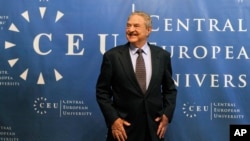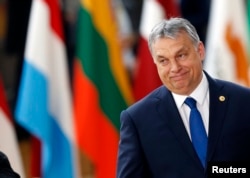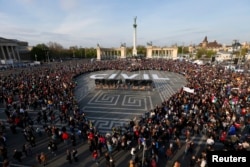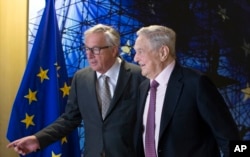In most nations, having a billionaire financier and philanthropist would be a source of great pride, a person many elected officials would want to cozy up to.
Not for George Soros.
The demonization of the American-Hungarian billionaire and Holocaust survivor has spread across Central Europe, with the 86-year-old increasingly accused by nationalists of using his money to force his liberal values, including support for refugees, on their societies.
And it's not just those on the fringes, but elected officials who are attributing all manner of sins to Soros, a political strategy that seems aimed at de-legitimizing projects that Soros has supported in Central and Eastern Europe's transition to democracy.
This groundswell began in late 2015, as large numbers of migrants and refugees were arriving in Europe. A far-right nationalist at an anti-refugee rally in Poland set fire to an effigy of an Orthodox Jew as a crowd chanted slogans against Islam and the European Union. The man said the Jewish figure represented Soros.
It wasn't always this way. In 2012, Poland's then-president, Bronislaw Komorowski, bestowed one of the country's highest orders on Soros, thanking him for his contributions to a nascent democratic civil society after communism.
Soros' donations have advanced human rights, the rule of law, public health, LGBT and Roma rights, education and even improved transportation. Many of the leaders turning against him now — including Hungarian Prime Minister Viktor Orban — got scholarships from Soros in the 1990s to study in the West or received research grants.
Officials today are much more likely to accuse Soros destroying their countries.
Liviu Dragnea, chairman of Romania's ruling Social Democratic Party, says Soros and his work "have fed evil in Romania.''
Krystyna Pawlowicz, a lawmaker with the ruling conservatives in Poland, called him the "most dangerous man in the world'' on Radio Maryja, a Catholic broadcaster. She said his foundations "finance anti-Christian and anti-national activities."
Sociologists see such rhetoric, which gives Soros almost supernatural abilities to destroy traditional societies, as a modern manifestation of old anti-Semitic conspiracies amid new populist rage against elites and the European Union.
"This narrative about Soros as an evil presence started with Russian President Vladimir Putin, and it is spreading," said Jacek Kucharczyk, a sociologist and director of the Institute of Public Affairs in Warsaw. "It is a witch hunt that is being promoted by authoritarian right-wing populists."
"And there is an undertone of anti-Semitism behind it. Because he promotes liberal values, has a Jewish background and is a billionaire, he is the perfect figure for explaining to hard-core voters why the world is the way it is," he said.
Kucharczyk, whose institute receives some Soros funding, said in places like Russia and Poland, where anti-Semitism has deep roots, Soros is "a very useful enemy to have."
Soros says his fight against intolerance is rooted in his own experience of living through the Nazi occupation of Hungary — which his family survived by hiding their Jewish identities. He has given away $12 billion to date, according to his Open Society Foundations.
Of that, $400 million has gone to Hungary, where Orban, the prime minister, has taken steps that could force the closure in Budapest of the acclaimed Central European University, which Soros founded in 1991 to help support the region's emerging democracies.
Orban has described Soros as an "American financial speculator attacking Hungary'' who has ``destroyed the lives of millions of Europeans."
Frans Timmermans, first vice president of the European Commission, said he found that language anti-Semitic — prompting an angry reaction from the Hungarian government, with Foreign Minister Peter Szijjarto saying Budapest's disputes with Soros have "absolutely nothing to do" with his Jewish origins.
Laura Silber, a spokeswoman at Soros' Open Society Foundations, said Orban's attacks on Soros are an attempt to distract Hungarians from the country's real problems.
"Orban is using George Soros as a scapegoat in an effort to deflect attention from issues of real importance to the Hungarian people, such as the country's deteriorating health care and education," Silber said.
The Associated Press requested an interview with Soros, but Silber said that he wasn't giving any interviews.
Rafal Pankowski, head of Never Again, an anti-racism organization in Warsaw, says the "current tendency to see Soros as a central figure in an alleged global Jewish conspiracy" is growing along with a rise in xenophobia and hate speech.
"Soros is a convenient target for those who reject liberal values and the vision of an open, pluralist society," said Pankowski, who gets no Soros funding. "Anti-Semitism is a core element of nationalist identity across Eastern and Central Europe."
The anti-Soros mood is particularly strong in Macedonia, where many right-wingers blame him for a political crisis that has dragged on for two years over a massive illegal wiretapping operation of top leaders that has revealed wrongdoing. A group called Stop Operation Soros, or SOS, emerged in January.
Poland's ruling party leader, Jaroslaw Kaczynski, accuses Soros of trying to destroy traditional societies by forcing multiculturalism on them.
"The ideas of Mr. Soros, ideas of societies that have no identity, are convenient ideas for those who have billions, because such a society is extremely easy to manipulate," Kaczynski said.
Mark Weitzman, director of government affairs for the Simon Wiesenthal Center, a Jewish human rights group, sees the rhetoric as ``reminiscent of previous anti-Semitic patterns.''
"This is not to say that Soros should be above criticism. But there are certainly other elements involved that go beyond legitimate and specific criticism and focus on his Jewish roots," Weitzman said. There's a need by some "to create a global manipulative Jewish monster which can be blamed for all the evils and problems."







